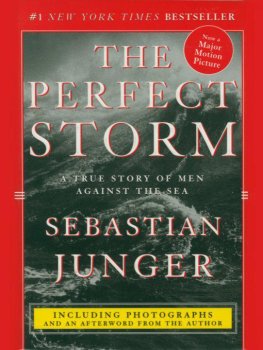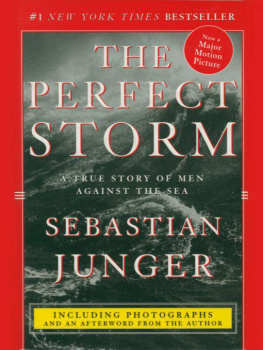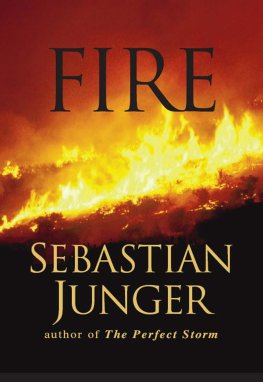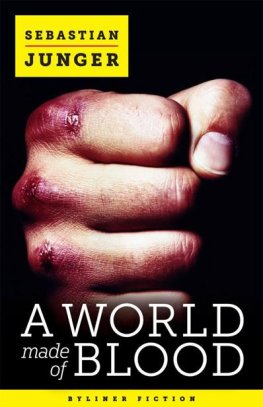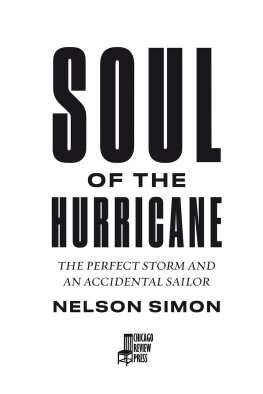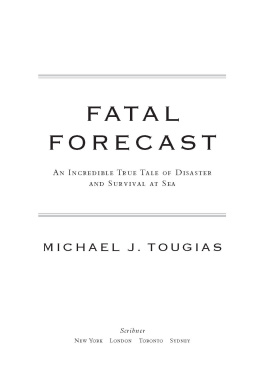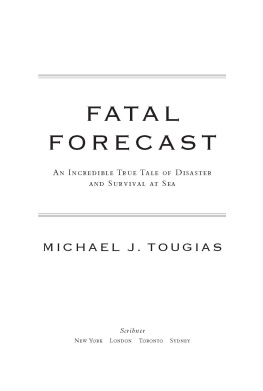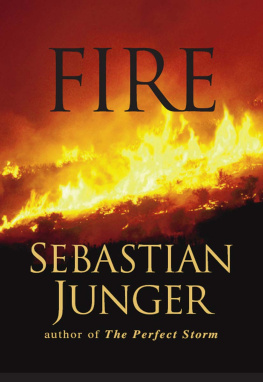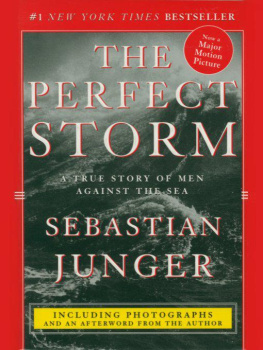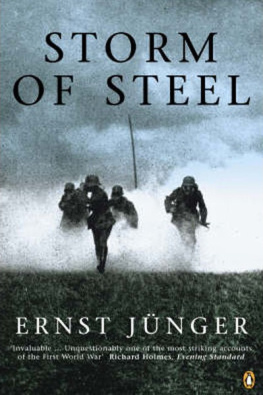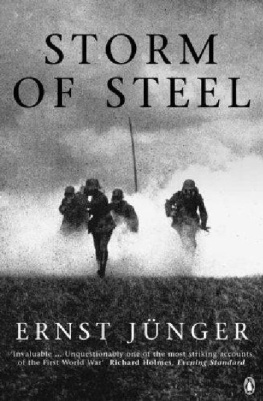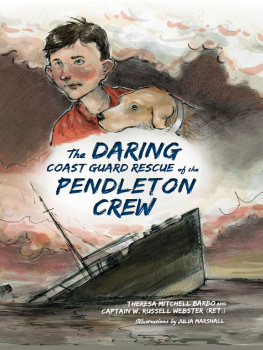Sebastian Junger
THE PERFECT STORM
A True Story of Men Against the Sea
THIS BOOK IS DEDICATED TO MY FATHER, WHO FIRST INTRODUCED ME TO THE SEA

RECREATING the last days of six men who disappeared at sea presented some obvious problems for me. On the one hand, I wanted to write a completely factual book that would stand on its own as a piece of journalism. On the other hand, I didnt want the narrative to asphyxiate under a mass of technical detail and conjecture. I toyed with the idea of fictionalizing minor parts of the storyconversations, personal thoughts, day-to-day routinesto make it more readable, but that risked diminishing the value of whatever facts I was able to determine. In the end I wound up sticking strictly to the facts, but in as wide-ranging a way as possible. If I didnt know exactly what happened aboard the doomed boat, for example, I would interview people who had been through similar situations, and survived. Their experiences, I felt, would provide a fairly good description of what the six men on the Andrea Gail had gone through, and said, and perhaps even felt.
As a result, there are varying kinds of information in the book. Anything in direct quotes was recorded by me in a formal interview, either in person or on the telephone, and was altered as little as possible for grammar and clarity. All dialogue is based on the recollection of people who are still alive, and appears in dialogue form without quotation marks. No dialogue was made up. Radio conversations are also based on peoples recollections, and appear in italics in the text. Quotes from published material are in italics, and have occasionally been condensed to better fit the text. Technical discussions of meteorology, wave motion, ship stability, etc., are based on my own library research and are generally not referenced, but I feel compelled to recommend William Van Dorns The Oceanography of Seamanship as a comprehensive and immensely readable text on ships and the sea.
In short, Ive written as complete an account as possible of something that can never be fully known. It is exactly that unknowable element, however, that has made it an interesting book to write and, I hope, to read. I had some misgivings about calling it The Perfect Storm, but in the end I decided that the intent was sufficiently clear. I use perfect in the meteorological sense: a storm that could not possibly have been worse. I certainly mean no disrespect to the men who died at sea or the people who still grieve for them.
My own experience in the storm was limited to standing on Gloucesters Back Shore watching thirty-foot swells advance on Cape Ann, but that was all it took. The next day I read in the paper that a Gloucester boat was feared lost at sea, and I clipped the article and stuck it in a drawer. Without even knowing it, I had begun to write The Perfect Storm.
ONE midwinter day off the coast of Massachusetts, the crew of a mackerel schooner spotted a bottle with a note in it. The schooner was on Georges Bank, one of the most dangerous fishing grounds in the world, and a bottle with a note in it was a dire sign indeed. A deckhand scooped it out of the water, the sea grass was stripped away, and the captain uncorked the bottle and turned to his assembled crew: On Georges Bank with our cable gone our rudder gone and leaking. Two men have been swept away and all hands have been given up as our cable is gone and our rudder is gone. The one that picks this up let it be known. God have mercy on us.
The note was from the Falcon, a boat that had set sail from Gloucester the year before. She hadnt been heard from since. A boat that parts her cable off Georges careens helplessly along until she fetches up in some shallow water and gets pounded to pieces by the surf. One of the Falcons crew must have wedged himself against a bunk in the focsle and written furiously beneath the heaving light of a storm lantern. This was the end, and everyone on the boat would have known it. How do men act on a sinking ship? Do they hold each other? Do they pass around the whisky? Do they cry?
This man wrote; he put down on a scrap of paper the last moments of twenty men in this world. Then he corked the bottle and threw it overboard. Theres not a chance in hell, he must have thought. And then he went below again. He breathed in deep. He tried to calm himself. He readied himself for the first shock of sea.
Its no fish yere buying, its mens lives.
SIR WALTER SCOTT The Antiquary,
Chapter IIA SOFT fall rain slips down through the trees and the smell of ocean is so strong that it can almost be licked off the air. Trucks rumble along Rogers Street and men in t-shirts stained with fishblood shout to each other from the decks of boats. Beneath them the ocean swells up against the black pilings and sucks back down to the barnacles. Beer cans and old pieces of styrofoam rise and fall and pools of spilled diesel fuel undulate like huge iridescent jellyfish. The boats rock and creak against their ropes and seagulls complain and hunker down and complain some more. Across Rogers Street and around the back of the Crows Nest, through the door and up the cement stairs, down the carpeted hallway and into one of the doors on the left, stretched out on a double bed in room number twenty-seven with a sheet pulled over him, Bobby Shatford lies asleep.
Hes got one black eye. There are beer cans and food wrappers scattered around the room and a duffel bag on the floor with t-shirts and flannel shirts and blue jeans spilling out.
Lying asleep next to him is his girlfriend, Christina Cotter. Shes an attractive woman in her early forties with rust-blond hair and a strong, narrow face. Theres a TV in the room and a low chest of drawers with a mirror on top of it and a chair of the sort they have in high-school cafeterias. The plastic cushion cover has cigarette burns in it. The window looks out on Rogers Street where trucks ease themselves into fish-plant bays.
Its still raining. Across the street is Rose Marine, where fishing boats fuel up, and across a small leg of water is the State Fish Pier, where they unload their catch. The State Pier is essentially a huge parking lot on pilings, and on the far side, across another leg of water, is a boatyard and a small park where mothers bring their children to play. Looking over the park on the corner of Haskell Street is an elegant brick house built by the famous Boston architect, Charles Bulfinch. It originally stood on the corner of Washington and Summer Streets in Boston, but in 1850 it was jacked up, rolled onto a barge, and transported to Gloucester. That is where Bobbys mother, Ethel, raised four sons and two daughters. For the past fourteen years she has been a daytime bartender at the Crows Nest. Ethels grandfather was a fisherman and both her daughters dated fishermen and all four of the sons fished at one point or another. Most of them still do.
The Crows Nest windows face east into the coming day over a street used at dawn by reefer trucks. Guests dont tend to sleep late. Around eight oclock in the morning, Bobby Shatford struggles awake. He has flax-brown hair, hollow cheeks, and a sinewy build that has seen a lot of work. In a few hours hes due on a swordfishing boat named the Andrea Gail, which is headed on a one-month trip to the Grand Banks. He could return with $5,000 in his pocket or he could not return at all. Outside, the rain drips on. Chris groans, opens her eyes, and squints up at him. One of Bobbys eyes is the color of an overripe plum.

